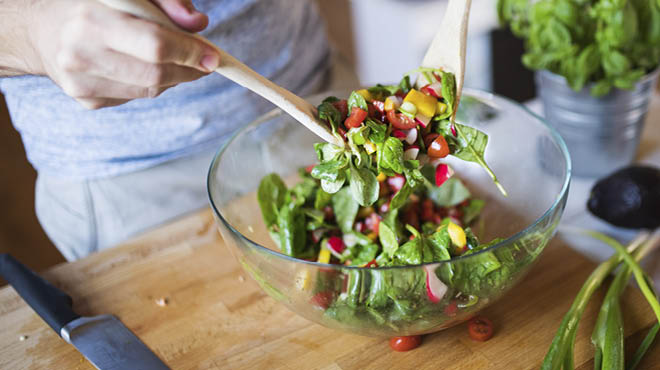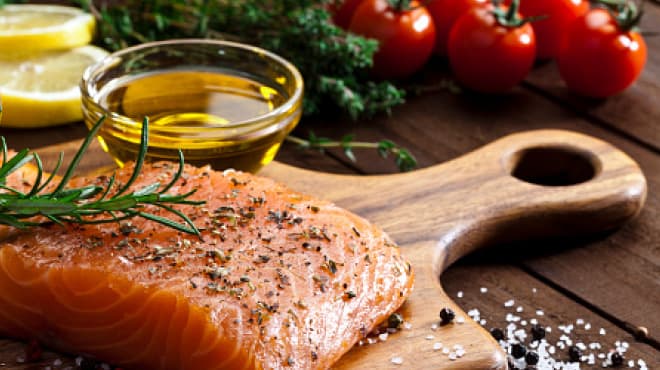Follow a cholesterol-lowering diet during the holidays

You may be adding annual celebrations to your calendar this time of the year, and many of those gatherings include delicious foods. Holiday encourage events tend to encourage people to overindulge in holiday goodies that often are high in calories and fat. This is because some foods are only served during the holidays, and you want to experience the tastes and memories associated with holiday favorites.
However, what you eat and drink affects your health. This includes your cholesterol and triglyceride levels. If you have a high amount of cholesterol in your blood, your healthcare team may recommend following a cholesterol-lowering diet. High cholesterol could cause your heart arteries to harden, a condition called atherosclerosis, which could lead to coronary artery disease. In addition, hardened arteries may allow a coating called plaque to build up and partially block your arteries. Blocked arteries can lead to low blood flow in the heart and chest pain.
What are triglycerides and cholesterol?
Triglycerides and cholesterol are types of fat, or lipids, which circulate in your blood. Triglycerides store unused calories and provide your body with energy. Cholesterol is used to build cells and certain hormones.
Cholesterol is made mainly by the liver. It also can enter your body in the foods you eat that contain animal fat. Foods that come from animals or contain animal fat include meat, egg yolks, lard and dairy products. The type and amount of fat you eat can influence how much cholesterol your body makes.
Your body makes triglycerides from excess calories, regardless of the calorie source, such as fat, protein or carbohydrates. Triglycerides also are made from excess sugar and alcohol. High triglyceride levels are a risk factor for heart disease.
Lifestyle choices for improving your levels
Your healthcare team may recommend some of these lifestyle changes to improve your blood cholesterol levels and lower your triglyceride level:
- Eat a plant-based diet.
Eat more high-fiber foods from plants. Choose 100% whole grains, whole fruits and vegetables. - Exercise regularly.
- Get to and stay at a healthy body weight.
- Limit or avoid trans fats.
Trans fats can raise blood cholesterol. - Limit your intake of high-cholesterol foods.
Reduce consumption of foods like egg yolks, organ meats, animal fat and high-fat dairy. - Lower your total fat intake.
All oils and fats are high in calories. - Lower your saturated fat intake.
Saturated fat can raise blood cholesterol. - Replace saturated fats with unsaturated fats.
Unsaturated fats can lower your blood cholesterol levels. Monounsaturated fats are preferred. Polyunsaturated fats are OK.
Enjoying the holidays
The average adult will consume more than 4,000 calories during Thanksgiving, including many high-fat items that don't align well with a cholesterol-lowering diet. You can still enjoy the foods you love during the holidays, but you can prioritize and plan to spend your calories and fat intake wisely.
For example, if stuffing with gravy is your favorite, then cut out green bean casserole or white dinner rolls. In addition, you can celebrate the holiday in a healthier way and lower the effect on your cholesterol by making ingredient substitutions. Your meal still can be bountiful and delicious but lower in calories and fat.
Consider these better choices and what to avoid:
| Better Choices | Avoid |
| Whole-grain bread | Commercial quick breads, such as croissants, canned refrigerated biscuits, pastries and sweet rolls |
| Plain fresh or frozen vegetables | Vegetables with butter, cream or sauces |
| Whole fruits | Fruits with cream, sauces and dip |
| White turkey meat without skin | Dark turkey meat with skin on |
| Fresh cranberry sauce | Canned cranberry sauce |
| Gravy made from turkey or chicken stock | Gravy made from cream or fat drippings |
| Margarine with liquid oil listed as the first ingredient, such as soybean or canola oil | Butter |
| Baked goods made with nonfat yogurt or applesauce | Baked goods made with saturated fats, such as shortening, coconut oil or stick margarine |
| Reduced-calorie or fat-free salad dressing | Regular salad dressing |
| Nonfat frozen yogurt | Regular ice cream |
| Carbonated or flavored water (sugar-free) | Sports or soft drinks |
| Skin or low-fat (1%) milk | Whole or reduced-fat (2%) milk |
Ripu Singh, M.D., is a cardiologist in Mankato and Waseca, Minnesota.



